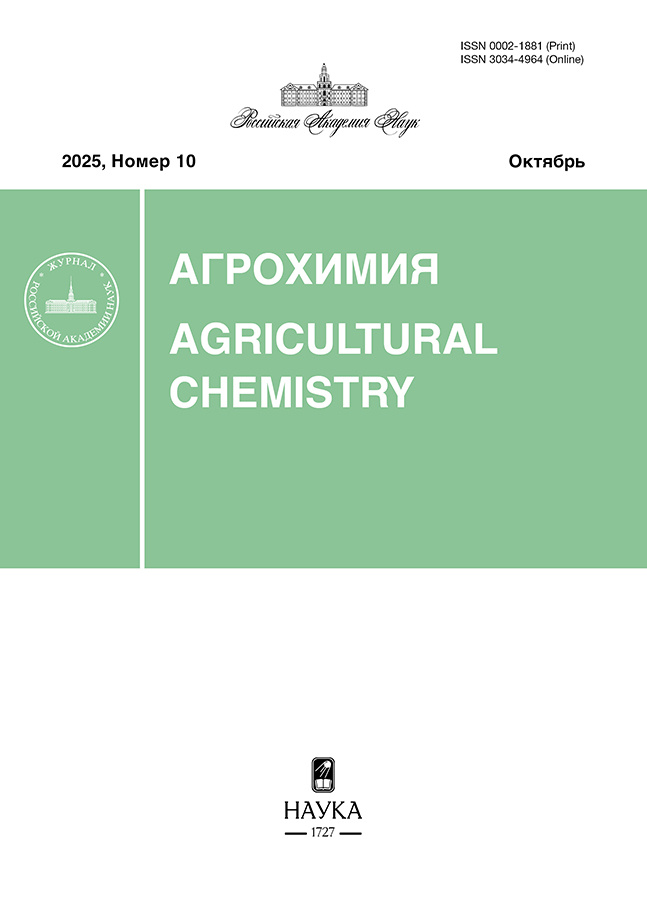Совместное воздействие штамма PGPB Pseudomonas plecoglossicida 2,4-D и гуминовых веществ на рост, содержание фотосинтетических пигментов и фитогормонов в растениях пшеницы в условиях засухи
- Авторы: Феоктистова А.В.1, Тимергалин М.Д.1, Рамеев Т.В.1, Четвериков С.П.1
-
Учреждения:
- Уфимский институт биологии – обособленное структурное подразделение Уфимского федерального исследовательского центра РАН
- Выпуск: № 9 (2023)
- Страницы: 28-36
- Раздел: Регуляторы роста растений
- URL: https://journals.rcsi.science/0002-1881/article/view/139654
- DOI: https://doi.org/10.31857/S0002188123090065
- EDN: https://elibrary.ru/VEZILD
- ID: 139654
Цитировать
Полный текст
Аннотация
Показано накопление сырой массы растений пшеницы при обработке штаммом бактерий Pseudomonas plecoglossicida 2,4-D и гуминовыми веществами при дефиците почвенной влаги. Стимуляция роста растений связана с активацией роста корня, что приводило к увеличению индекса азотного баланса и концентрации хлорофилла в побегах обработанных растений. Обнаруженное увеличение концентрации хлорофилла в растениях, обработанных P. plecoglossicida 2,4-D, коррелировало со снижением содержания абсцизовой кислоты в побегах, а у растений, обработанных гуматами – с увеличением цитокининов в побегах. Более высокая эффективность обработки растений комбинацией бактерий и гуминовых веществ, чем любым из них в отдельности, может быть связана с аддитивным эффектом этих обработок на гормональный баланс.
Ключевые слова
Об авторах
А. В. Феоктистова
Уфимский институт биологии – обособленное структурное подразделениеУфимского федерального исследовательского центра РАН
Автор, ответственный за переписку.
Email: feoktistova.arisha@yandex.ru
Россия, 450054, Уфа, просп. Октября, 69
М. Д. Тимергалин
Уфимский институт биологии – обособленное структурное подразделениеУфимского федерального исследовательского центра РАН
Email: feoktistova.arisha@yandex.ru
Россия, 450054, Уфа, просп. Октября, 69
Т. В. Рамеев
Уфимский институт биологии – обособленное структурное подразделениеУфимского федерального исследовательского центра РАН
Email: feoktistova.arisha@yandex.ru
Россия, 450054, Уфа, просп. Октября, 69
С. П. Четвериков
Уфимский институт биологии – обособленное структурное подразделениеУфимского федерального исследовательского центра РАН
Email: feoktistova.arisha@yandex.ru
Россия, 450054, Уфа, просп. Октября, 69
Список литературы
- Ruzzi M., Aroca R. Plant growth-promoting rhizobacteria act as biostimulants in horticulture // Sci. Hortic. 2015. V. 196. P. 124–134. https://doi.org/10.1016/j.scienta.2015.08.042
- Backer R., Rokem J.S., Ilangumaran G., Lamont J., Praslickova D., Ricci E., Subramanian S., Smith D.L. Plant growth-promoting rhizobacteria: Context, mechanisms of action, and roadmap to commercialization of biostimulants for sustainable agriculture // Front. Plant Sci. 2018. V. 9. P. 1473. https://doi.org/10.3389/fpls.2018.01473
- Kudoyarova. G., Arkhipova T., Korshunova T., Bakaeva M., Loginov O., Dodd I.C. Phytohormone mediation of interactions between plants and non-symbiotic growth promoting bacteria under edaphic stresses // Front. Plant Sci. 2019. V. 10. P. 1368. https://doi.org/10.3389/fpls.2019.01368
- Richardson A.E., Barea J.M., Mc Neill A.M., Prigent-Combaret C. Acquisition of phosphorus and nitrogen in the rhizosphere and plant growth promotion by microorganisms // Plant Soil. 2009. V. 321. P. 305–339. https://doi.org/10.1007/s11104-009-9895-2
- Kudoyarova G.R., Vysotskaya L.B., Arkhipova T.N., Kuzmina L.Y., Galimsyanova N.F., Sidorova L.V., Gabbasova I.M., Melentiev A.I., Veselov S.Y. Effect of auxin producing and phosphate solubilizing bacteria on mobility of soil phosphorus, growth rate, and P acquisition by wheat plants // Acta Physiol. Plant. 2017. V. 39. P. 253. https://doi.org/10.1007/s11738-017-2556-9
- Meena V.S., Mauryaa B.R., Verma J.P. Does a rhizospheric microorganism enhance K+ availability in agricultural soils? // Microbiol. Res. 2014. V. 169. P. 337–334. https://doi.org/10.1016/j.micres.2013.09.003
- Islam M.R., Sultana T., Joe M.M., Yim W., Cho J.-C., Sa T. Nitrogen-fixing bacteria with multiple plant growth-promoting activities enhance growth of tomato and red pepper // J. Basic Microbiol. 2013. V. 53. P. 1004–1015. https://doi.org/10.1002/jobm.201200141
- Asari S., Tarkowská D., Rolčík J., Novák O., David Palmero D.V., Bejai S., Meijer J. Analysis of plant growth-promoting properties of Bacillus amyloliquefaciens UCMB5113 using Arabidopsis thaliana as host plant // Planta. 2017. V. 245. P. 15–30.
- Bakhshandeh E., Gholamhosseini M., Yaghoubian Y., Pirdashti H. Plant growth promoting microorganisms can improve germination, seedling growth and potassium uptake of soybean under drought and salt stress // Plant Growth Regul. 2020. V. 90. P. 123–136. https://doi.org/10.1007/s10725-019-00556-5
- Czarnes S., Mercier P.-E., Lemoine D.G., Hamzaoui J., Legendre L. Impact of soil water content on maize responses to the plant growth-promoting rhizobacterium Azospirillum lipoferum CRT1 // J. Agro. Crop Sci. 2020. V. 206. P. 505–516. https://doi.org/10.1111/jac.12399
- Mukhtar T., Rehman S., Smith D., Sultan T., Seleiman M.F., Alsadon A.A. Mitigation of heat stress in Solanum lycopersicum L. by ACC-deaminase and exopolysaccharide producing Bacillus cereus: Effects on biochemical profiling // Sustainability. 2020. V. 12. P. 2159. https://doi.org/10.3390/su12062159
- El-Sayed S.Y.S., Hagab R.H. Effect of organic acids and plant growth promoting rhizobacteria (PGPR) on biochemical content and productivity of wheat under saline soil conditions // Middle East J. Agric. Res. 2020. V. 9. P. 227–242. https://doi.org/10.36632/mejar/2020.9.2.2
- Shen J., Guo M., Wang Y., Yuan X., Wen Y., Song X., Dong S., Guo P. Humic acid improves the physiological and photosynthetic characteristics of millet seedlings under drought stress // Plant Signal. Behav. 2020. V. 15. № 8. P. 1774212. https://doi.org/10.1080/15592324.2020.1774212
- Canellas L.P., Olivares F.L., Aguiar N.O., Jones D.L., Nebbioso A., Mazzei P. Humic and fulvic acids as biostimulants in horticulture // Sci. Hortic. 2015. V. 196. P. 15–27. https://doi.org/10.1016/j.scienta.2015.09.013
- Olaetxea M., De Hita D., Garcia C.A., Fuentes M., Baigorri R., Mora V. Hypothetical framework integrating the main mechanisms involved in the promoting action of rhizospheric humic substances on plant root and shoot-growth // Appl. Soil Ecol. 2017. V. 123. P. 521–537. https://doi.org /https://doi.org/10.1016/j.apsoil.2017.06.007
- Nazarov A.M., Garankov I.N., Tuktarova I.O., Salmanova E.R., Arkhipova T.N., Ivanov I.I., Feoktistova A.V., Prostyakova Z.G., Kudoyarova G.R. Hormone balance and shoot growth in wheat (Triticum durum Desf.) plants as influenced by sodium humates of the granulated organic fertilizer // Agricult. Biol. 2020. V. 55. P. 945–955.
- Ullah A., Ali M., Shahzad K., Ahmad F., Iqbal S., Rahman M.H.U., Ahmad S., Iqbal M.M., Danish S., Fahad S., Alkahtani J. Impact of seed dressing and soil application of potassium humate on cotton plants productivity and fiber quality // Plants. 2020. V. 9. P. 1444. https://doi.org/10.3390/plants9111444
- Olaetxea M., Mora V., Bacaicoa E., Garnica M., Fuentes M., Casanova E., Zamarreño A.M., Iriarte J.C., Etayo D., Ederra I. Abscisic acid regulation of root hydraulic conductivity and aquaporin gene expression is crucial to the plant shoot growth enhancement caused by rhizosphere humic acids // Plant Physiol. 2015. V. 169. P. 2587–2596. https://doi.org/10.1104/pp.15.00596
- Tikhonov V.V., Yakushev A.V., Zavgorodnyaya Y.A., Byzov B.A., Demin V.V. Effects of humic acids on the growth of bacteria // Euras. J. Soil Sci. 2010. V. 43. P. 305–313. https://doi.org/10.1134/S1064229310030087
- Verbon E.H., Liberman L.M. Beneficial microbes affect endogenous mechanisms controlling root development // Trends Plant Sci. 2016. V. 21. P. 218–229. https://doi.org/10.1016/j.tplants.2016.01.013
- Cueva-Yesquén L.G., Goulart M.C., Attili de Angelis D., Nopper Alves M., Fantinatti-Garboggini F. Multiple plant growth-promotion traits in endophytic bacteria retrieved in the vegetative stage from passionflower // Front. Plant Sci. 2021. V. 11. P. 621740. https://doi.org/10.3389/fpls.2020.621740
- Feoktistova A., Bakaeva M., Timergalin M., Chetverikova D., Kendjieva A., Rameev T., Hkudaygulov G., Nazarov A., Kudoyarova G., Chetverikov S. Effects of humic substances on the growth of Pseudomonas plecoglossicida 2,4-D and wheat plants inoculated with this strain // Microorganisms. 2022. V. 10. P. 1066. https://doi.org/10.3390/microorganisms10051066
- Hai N.N., Chuong N.N., Tu N.H.C., Kisiala A., Hoang X.L.T., Thao N.P. Role and regulation of cytokinins in plant response to drought stress // Plants (Basel). 2020. V. 9. P. 422. https://doi.org/10.3390/plants9040422
- Muhammad Aslam M., Waseem M., Jakada B.H., Okal E.J., Lei Z., Saqib H.S.A., Yuan W., Xu W., Zhang Q. Mechanisms of abscisic acid-mediated drought stress responses in plants // Inter. J. Mol. Sci. 2022. V. 23. P. 1084. https://doi.org/10.3390/10.3390/ijms23031084
- Chetverikov S.P., Sharipov D.A., Korshunova T.Y., Loginov O.N. Degradation of perfluorooctanyl sulfonate by strain Pseudomonas plecoglossicida 2,4-D // Appl. Biochem. Microbiol. 2017. V. 53. P. 533–538. https://doi.org/10.1134/S0003683817050027
- Bakaeva M., Kuzina E., Vysotskaya L., Kudoyarova G., Arkhipova T., Rafikova G., Chetverikov S., Korshunova T., Chetverikova D., Loginov O. Capacity of Pseudomonas strains to degrade hydrocarbons, produce auxins and maintain plant growth under normal conditions and in the presence of petroleum contaminants // Plants. 2020. V. 9. P. 379. https://doi.org/10.3390/plants9030379
- Vysotskaya L.B., Korobova A.V., Veselov S.Y., Dodd I.C., Kudoyarova G.R. ABA mediation of shoot cytokinin oxidase activity: assessing its impacts on cytokinin status and biomass allocation of nutrient deprived durum wheat // Funct. Plant Biol. 2009. V. 36. P. 66–72.
- Kudoyarova G.R., Melentiev A.I., Martynenko E.V., Arkhipova T.N., Shendel G.V., Kuzmina L.Y., Dodd I.C., Veselov S.Yu. Cytokinin producing bacteria stimulate amino acid deposition by wheat roots // Plant Physiol. Biochem. 2014. V. 83. P. 285–291. https://doi.org/10.1016/j.plaphy.2014.08.015
- Nacry P., Canivenc G., Muller B., Azmi A., Onckelen H.V., Rossignol M., Doumas P. A role for auxin redistribution in the response of the root system architecture to phosphate starvation in Arabidopsis // Plant Physiol. 2005. V. 138. P. 2061–2074. https://doi.org/10.1104/pp.105.060061
- Yang J., Worley E., Udvardi M. A NAP-AAO3 regulatory module promotes chlorophyll degradation via aba biosynthesis in Arabidopsis leaves // Plant Cell. 2014. V. 26. P. 4862–4874. https://doi.org/10.1105/tpc.114.133769
- Belimov A.A., Dodd I.C., Safronova V.I., Dumova V.A., Shaposhnikov A.I., Ladatko A.G., Davies W.J. Abscisic acid metabolizing rhizobacteria decrease ABA concentrations in planta and alter plant growth // Plant Physiol. Biochem. 2014. V. 74. P. 84–91. https://doi.org/10.1016/j.plaphy.2013.10.032
- Pizzeghello D., Francioso O., Ertani A., Muscolo A., Nardi S. Isopentenyladenosine and cytokinin-like activity of different humic substances // J. Geochem. Explor. 2013. V. 129. P. 70–75.
- Hönig M., Plíhalova L., Husičkova A., Nisler J., Doležal K. Role of cytokinins in senescence, antioxidant defence and photosynthesis // Inter. J. Mol. Sci. 2018. V. 19. P. 4045. https://doi.org/10.3390/ijms19124045
- Korobova A.V., Akhiyarova G.R., Veselov S.Y., Kudoyarova G.R., Fedyaev V.V., Farkhutdinov R.G. Participation of nitrate sensor NRT1.1 in the control of cytokinin level and root elongation under normal conditions and nitrogen deficit // Mosc. Univ. Biol. Sci. Bull. 2019. V. 74. P. 221–226. https://doi.org/10.3103/S0096392519040072
- Werner T., Nehnevajova E., Köllmer I., Novak O., Strnad M., Krämer U., Schmülling T. Root-specific reduction of cytokinin causes enhanced root growth, drought tolerance, and leaf mineral enrichment in Arabidopsis and Tobacco // Plant Cell. 2010. V. 22. P. 3905–3920. https://doi.org/10.1105/tpc.109.072694
- Liu S., Strauss S., Adibi M., Mosca G., Yoshida S., Ioio R.D., Runions A., Andersen T.G., Grossmann G., Huijser P., Smith R.S., Tsiantis M. Cytokinin promotes growth cessation in the Arabidopsis root // Curr. Biol. 2022. V. 32. P. 1974–1985. https://doi.org/10.1016/j.cub.2022.03.019
- Jones B.J., Ljung K. Auxin and cytokinin regulate each other’s levels via a metabolic feedback loop // Plant Signal. Behav. 2011. V. 6. P. 901–904. https://doi.org/10.4161/psb.6.6.15323
Дополнительные файлы













